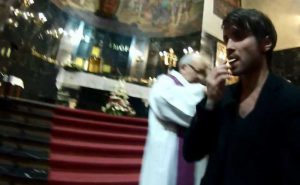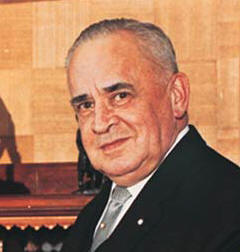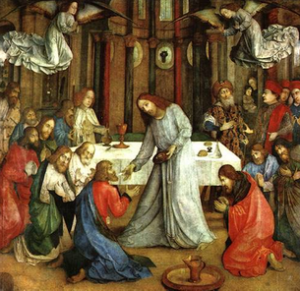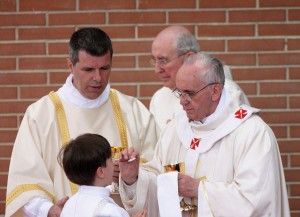Do you remember a time when someone made fun of your family? Made fun perhaps of the job your father had, the way your mother dressed, the way your brother acted, the intelligence of your sister? How did you feel?
 There’s a wonderful scene from the old TV show The Wonder Years, where Kevin, the young boy, goes for a day to his father’s work (Start at 18:10). He sees his father outside of home, in action, working with other adults, and realizes, “I never forgot how I felt at that moment: My father was great man.” When they go into the next room, he then sees his father get shouted at by the boss, lambasted for incompetency, and his father is helpless. Kevin watches this and is demoralized.
There’s a wonderful scene from the old TV show The Wonder Years, where Kevin, the young boy, goes for a day to his father’s work (Start at 18:10). He sees his father outside of home, in action, working with other adults, and realizes, “I never forgot how I felt at that moment: My father was great man.” When they go into the next room, he then sees his father get shouted at by the boss, lambasted for incompetency, and his father is helpless. Kevin watches this and is demoralized.
A truth of relationships is: When you pick on someone we love, you pick on us. When you love someone we love, you love us. We identify with those we love.
Today is the feast of Corpus Christi, which is Latin for The Body of Christ. We celebrate that Jesus loves us so much that he has given Himself to us under the appearance of bread and wine. The entrance antiphon was: “He fed them with the finest wheat and satisfied them with honey from the rock.” The Eucharist is the finest gift, and, because it’s Jesus Himself, it’s someone we love. And the truth of relationships applies here: when someone hurts or loves the Eucharist, they hurt or love us.
Two stories illustrate this point.

 1) Last November, a Spanish artist stole hosts from Mass and used them to write the word, “Pederasty,” [sexual abuse of children] on the ground. He said he attended 242 Masses, and each time, pretended to put the Eucharist in his mouth, then walked off with it. He stole 242 hosts and desecrated them. For many of us, this sacrilege is deeply hurtful and painful, because the Eucharist means everything to us.
1) Last November, a Spanish artist stole hosts from Mass and used them to write the word, “Pederasty,” [sexual abuse of children] on the ground. He said he attended 242 Masses, and each time, pretended to put the Eucharist in his mouth, then walked off with it. He stole 242 hosts and desecrated them. For many of us, this sacrilege is deeply hurtful and painful, because the Eucharist means everything to us.
 2) The second story is the exact opposite. Paul Comtois was selected as lieutenant governor (the personal representative of the Queen) of Quebec in 1959. He was a politician and a devout Catholic, so much so that, when he became lieutenant governor, he requested permission from the cardinal of Quebec to have the Eucharist reserved in a tabernacle at his home. This is extremely rare (not even Deacon Andrew, for example, has the Eucharist at his home; the norm is only in churches). “The cardinal was initially reluctant… but he eventually granted it, asking Comtois to personally assure the proper custody and care of the Eucharist. Comtois’s daily routine included family prayer, and he ended his days in the chapel before the Eucharist.
2) The second story is the exact opposite. Paul Comtois was selected as lieutenant governor (the personal representative of the Queen) of Quebec in 1959. He was a politician and a devout Catholic, so much so that, when he became lieutenant governor, he requested permission from the cardinal of Quebec to have the Eucharist reserved in a tabernacle at his home. This is extremely rare (not even Deacon Andrew, for example, has the Eucharist at his home; the norm is only in churches). “The cardinal was initially reluctant… but he eventually granted it, asking Comtois to personally assure the proper custody and care of the Eucharist. Comtois’s daily routine included family prayer, and he ended his days in the chapel before the Eucharist.
 The Comtois family and their guests returned to Bois-de-Coulonge [their home] after an evening event Feb. 21, 1966. Retiring after midnight, they were soon awakened by a raging fire that had started in the basement of the century-old house. Soon the entire building was in flame.”
The Comtois family and their guests returned to Bois-de-Coulonge [their home] after an evening event Feb. 21, 1966. Retiring after midnight, they were soon awakened by a raging fire that had started in the basement of the century-old house. Soon the entire building was in flame.”
‘As soon as the fire was noticed, the lieutenant governor immediately took charge, guiding his wife and children out of the house into the cold winter night outside. His daughter Mireille, however, noticed her father would not yet leave the tinderbox house.’
“As I was racing through the building to escape from the fire, I came upon my father in the chapel,” Mireille recalls. “As I was going to run to him, he firmly ordered me to jump from a nearby window, and I did, wondering why he did not do likewise.
The last I saw of him, he was standing under the sanctuary lamp in his pajamas and wearing around his neck the souvenir Rosary from his father which he said every night and wore to sleep.”
 Having been assured that all his family and guests had escaped the inferno, the 70-year-old Paul Comtois returned to the private chapel in which he visited the Lord every evening before bed to save the Blessed Sacrament from the desecrating fire. He reached the chapel, already engulfed in flames, but managed to make it to the tabernacle and remove the pyx containing the Body of Christ. Leaving the chapel, he descended the staircase which collapsed about him, and… was burned alive…
The fire… was so hot that the first firemen on the scene could not approach within 100 feet of the building.
Having been assured that all his family and guests had escaped the inferno, the 70-year-old Paul Comtois returned to the private chapel in which he visited the Lord every evening before bed to save the Blessed Sacrament from the desecrating fire. He reached the chapel, already engulfed in flames, but managed to make it to the tabernacle and remove the pyx containing the Body of Christ. Leaving the chapel, he descended the staircase which collapsed about him, and… was burned alive…
The fire… was so hot that the first firemen on the scene could not approach within 100 feet of the building.
“I was told,” Mireille continues, “that when they found him, his body was badly burned and his arms were no longer intact… Under the upper part of his body they found the pyx used to carry the Holy Eucharist. His body had saved it from the flames…. I can still picture him standing there in the light of the sanctuary lamp.’”
 In today’s Collect (Opening Prayer), we prayed: “O God… grant us… so to revere the sacred mysteries of your Body and Blood.” Jesus is asking us to treat the Eucharist with more reverence. He’s saying, “When you love the Eucharist, you love me.” All the saints had this love: they spent hours with the Eucharist, longed to receive it, and showed respect for it by kneeling and prostrating themselves on the ground. We need to increase our love for Jesus, and then recognize that this love should be equal for the Eucharist, because it’s the same Jesus.
In today’s Collect (Opening Prayer), we prayed: “O God… grant us… so to revere the sacred mysteries of your Body and Blood.” Jesus is asking us to treat the Eucharist with more reverence. He’s saying, “When you love the Eucharist, you love me.” All the saints had this love: they spent hours with the Eucharist, longed to receive it, and showed respect for it by kneeling and prostrating themselves on the ground. We need to increase our love for Jesus, and then recognize that this love should be equal for the Eucharist, because it’s the same Jesus.
Someone asked me to talk about not receiving the Eucharist, because, when she didn’t receive one time, people asked her why.
First of all, there are multiple reasons why we may not and sometimes cannot receive the Eucharist. We cannot receive the Eucharist if we’re not Catholic. Why? Because the Eucharist is a family meal. When Jesus had the Last Supper, not all were invited. The Eucharist is not a sacrament of hospitality but a family meal, and it presupposes that one has already entered the family through baptism. (Remember that none of us were born members of this family, so it’s nothing for which we can take credit; we entered into it through the free gift of baptism, something God offers to everyone.)
Receiving Communion also means that one has stayed in the family by love. When we cut off our relationship with Jesus through mortal sins, we can’t receive Him until we’ve apologized in the sacrament of Reconciliation. Why? Well, have you ever had an argument with someone at work, not talk, and then during a meeting with other people, try to pretend that everything’s fine? It’s fake. You smile and shake hands but it’s meaningless. It’s like someone committing adultery and then wanting a hug from the spouse—that’s not right. They’ve seriously damaged the relationship and now they’re pretending that the relationship is still good. When we commit a mortal sin, we shouldn’t pretend that everything’s okay by receiving the Eucharist, because it’s not. This doesn’t mean we’re bad people. We may have seriously hurt Jesus, but that doesn’t mean we’re bad. It simply means we have to repent and be reconciled and work on a few things. This also doesn’t mean that the Church doesn’t love us. We’re just doing what St. Paul did: lovingly warning each other not do receive Communion unworthily.
Another reason we cannot receive is if we’ve eaten food an hour before Communion. That’s the one hour “Eucharistic fast.”
There are other reasons too: one time, during a dinner, one of my friends made fun of someone, and the look on her face said she regretted saying it. After dinner, we had Mass (fasting for over an hour, of course!), and I noticed that she didn’t receive Communion, which she normally did. I never asked her why, but I suppose she didn’t feel right about doing it. Now keep in mind that what she said at dinner was not grave matter, so probably not a mortal sin. But she had such a sensitive conscience that she chose not to. Similarly, a friend of mine at the seminary once told me that he got so mad at a priest during Mass that he didn’t feel right about taking Communion!
The truth is: we don’t know why people don’t receive Communion, and generally we shouldn’t ask why or talk to others about them. One exception is when there’s a public sin, i.e., when someone is publicly living in a way that is gravely contrary to Church teaching. For example, someone is living with their boyfriend/girlfriend (called “cohabitation,” meaning it’s assumed they’re sexually active and not married) and everyone knows it, or someone is living in a gay/lesbian relationship, or someone is divorced and remarried, or a Catholic is civilly married only (all Catholics are supposed to have their marriages in a church so that it’s blessed by God). In these cases, we should gently remind them not to receive Communion and that, if they’d like, they can talk to a priest or someone named Deacon Andrew.
Now some people might be thinking: “Fr. Justin, if I don’t receive Communion, some people may think I’ve committed a mortal sin.” Actually, they don’t know that. The examples above are proof that it’s not always a mortal sin. Last year, during a Mass, Father (then Deacon) Lucio told me that he wouldn’t receive Communion. I didn’t ask him why because it’s none of my business (It was probably because he felt guilty for never cooking for me last summer, which he should feel badly about).
And here’s the deeper truth: someone who doesn’t receive Communion for a good reason often has great respect for the Eucharist! They love Jesus enough not to take it for granted.
A woman once wrote: “…By this time, I had three children, all who had been baptized Catholic. We attended Mass regularly, but as I was unable to receive Holy Communion [because she was divorced and remarried; but she was working on fixing it], I had to sit in the pew while they went up. At that time, it was not common to go up to receive a blessing… Sometimes I felt that I was not being a good role model to my children, so I went and talked to the priest who was part of the Marriage Tribunal… He said this: ‘You are being an excellent role model to your children, by persevering in your faith journey even though you cannot fully participate in the Mass.’” Wow! So true! When people don’t receive Communion, they are for sure being respectful, and that’s something to be admired! That’s a great example for our children. (And this woman’s faith has led to many blessings, because God is working miracles in her life, and, through her, her family is coming back to Jesus.)
What we want to avoid is taking the Eucharist for granted. Let’s say we go away for vacation as a family and didn’t every try to go to Sunday Mass, and then take Communion the next week without having first apologized in Reconciliation. That’s a bad example that will hurt our children, because we’re teaching them not to respect the Eucharist.
On this point, I’d just like to remind everyone that we need to work on teaching our children love for Jesus. Many of our children don’t have the reverence we adults have. This is seen sometimes in the way the rush receiving Communion or the way they handle the Eucharist in their hands. We’ve been working on this for over a year and there are some improvements but we still need more work. Even with reminders, it seems that many children still don’t get it, or, being children, just fall back into bad habits. We know our children are capable of more, because they show moments when they’re truly respectful.
 What we have to do is teach them, first of all, to love Jesus and the Eucharist (the internal), then we have to teach them that this is expressed in the way we receive. Here at St. Anthony’s, we receive kneeling, which signals to our children that this isn’t ordinary food, because no one eats kneeling. And I’d like to re-propose what we talked about last year: receiving Communion on the tongue, especially for children, because it decreases opportunities for children to mishandle the Eucharist in their hands, but, more importantly, it’s another sign that this isn’t ordinary food. It’s so extraordinary that we receive it kneeling! Experience teaches that this is a very effective way of instilling in our children a sense of the specialness of the Eucharist. Let’s teach them what the Eucharist is, and then insist that they have to receive it with the utmost love and devotion, whether on the hand or on the tongue.
What we have to do is teach them, first of all, to love Jesus and the Eucharist (the internal), then we have to teach them that this is expressed in the way we receive. Here at St. Anthony’s, we receive kneeling, which signals to our children that this isn’t ordinary food, because no one eats kneeling. And I’d like to re-propose what we talked about last year: receiving Communion on the tongue, especially for children, because it decreases opportunities for children to mishandle the Eucharist in their hands, but, more importantly, it’s another sign that this isn’t ordinary food. It’s so extraordinary that we receive it kneeling! Experience teaches that this is a very effective way of instilling in our children a sense of the specialness of the Eucharist. Let’s teach them what the Eucharist is, and then insist that they have to receive it with the utmost love and devotion, whether on the hand or on the tongue.
Last point: Just like it’s done in other churches, I’d like to start having ushers or Knights come to the ends of the altar rail just to make sure that no one walks off with the Eucharist. They will respectfully and lovingly just make sure that the Eucharist is protected. We want to give greater glory and honour to the Eucharist. When we love the Eucharist, we love Jesus.